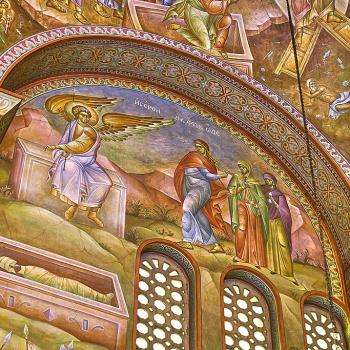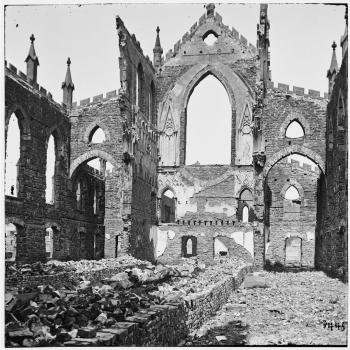
The Indian philosopher Bara Dada once said, “Jesus is ideal and wonderful, but you Christians, you are not like him.” Sadly, the truth of this can be seen throughout Christian history. On the one hand, Christian doctrine provides some of the most sublime, some of the most beautiful, indeed, some of the most liberating teachings of all; on the other hand, Christians have often engaged excuses to ignore or deny their implications. Ironically, when confronted by their behavior, Christians try to use their doctrine as a shield, acting as if it proves they can’t be so bad. They do not realize that the question is not about Christian doctrine, but about their hypocrisy. What is or is not authentic Christian doctrine is not the issue; the way Christians act is. Certainly, Christians should be concerned about doctrine and what it means, but non-Christians are concerned with what Christians do, especially the kinds of abuses Christians have engaged throughout history. To be sure, many of the implications of Christian doctrine take time for Christians to realize and act upon, as, for example, happened with slavery, but on the other hand, the reason why it takes so long is because Christians often fight tooth and nail against the implications of Christian doctrine. Instead of changing and making things better, they want to find ways to keep the status quo. This can be seen in the way Christians have engaged women throughout the centuries: on the one hand, Christian doctrine, and early Christian practice, shows they were to be elevated, to be given respect and to be recognized as equals with men, but on the other hand, we see that their elevation was fought against until women had their place in Christian society denigrated. Just as Christians should have known slavery was wrong and eliminated its institution much sooner than they did, they should have realized their theological principles concerning women were not being followed and that they should have changed their ways to make sure women were elevated in society (instead of waiting for secular society to force them to do so).
The difference between people, including the difference between genders, are not to be disputed, but they are to be understood as personal, relative distinctions, not essential one. Even though people are different, they are to be understood as being equal and given an equal share in spiritual charisms. “For it is not possible that in the spiritual gifts there should be any difference of sex, since in Christ Jesus there is neither man nor woman [cf. Gal 3:28], but we should all be one in him.” [1]. Or, as St Maximos explained:
For numerous and of almost infinite number are the men, women, and children who are distinct from one another and vastly different by birth and appearance, by nationality and language, by customs and age, by opinions and skills, by manners and habits, by pursuits and studies, and still again by reputation, fortune, characteristics, and connections: All are born into the Church and through it are reborn and recreated in the Spirit. To all in equal measures it gives and bestows one divine form and designation, to be Christ’s and to carry his name. [2]
Origen understood that the equality of all under Christ meant that women should not be denied ministerial roles:
And therefore, this passage teaches two things at the same time: As we have said, women are to be considered ministers in the Church, and the kind who have assisted many and who through good services have merited attaining unto apostolic praise ought to be received in the ministry.[3]
Women, to be sure, held a central place in Christ’s ministry. It was women who were the most faithful, standing by him during his passion. It was St. Mary Magdalene, and the myrrh-bearing women, who were given the first call to preach on the resurrected Christ. And we see this continuing in the early church. Women were made prophets. St. Thecla engaged evangelism alongside St. Paul. Women were ordained deacons. Women kept the people together and helped mediate conflicts. Women promoted and defended Christian dogmas, such as when St. Pulcheria confronted Nestorius. And, as St. Pulcheria pointed out, it was a woman, Mary, the Theotokos, that God chose to bring forth the incarnate God-man into the world. Thus, as Pope Francis said:
In the history of salvation, it was a woman who welcomed God’s Word. Women too kept alive the flame of faith in the dark night, awaiting and then proclaiming the Resurrection. Women find deep and joyful fulfilment in precisely these two acts: welcoming and proclaiming. They are the protagonists of a Church that goes forth, listening and caring for the needs of others, capable of fostering true processes of justice and bringing the warmth of a home to the various social environments where they find themselves. Listening, reflection and loving activity: these are the elements of a joy ever renewed and shared with others through feminine insight, the care of creation, the gestation of a more just world, and the creation of a dialogue that respects and values differences.[4]
Authentic Christian doctrine should encourage us to elevate women. The fact that we have historically done the opposite, with few significant exceptions, explains some of the problems contained in the Christian community. Christianity has not allowed all of humanity to thrive. And once some (women) had been denigrated, it easily led to others (such as the poor) to be similarly denigrated. This means that Christians have not properly lived out the doctrines which they proclaim. The corruption and sin we find promoted within the Christian community comes, at least in part, from this. To deal with that corruption, we must engage its sources, including its mistreatment of women. We must embrace a kind of revolution from within, one which properly promotes women and their status, giving way to the contributions they have which have otherwise been suppressed. Vladimir Solovyov got a glimpse of this need in 19th century Russia. He believed that women would help provide for a needed revolution within Christianity (despite the biases he had concerning women which influenced the way he thought of them): “I’m guessing that women will play an important role in the consciousness of humanity even with the revolution that lies ahead.” [5] And so, though we have often seen men elevated because of the way the God-man, in becoming human, became a man, we have failed to follow through with what Augustine suggested, which is recognize that the incarnation through a woman should indicate that the God-man has elevated women as well: “By possessing a male nature and being born of a woman He further showed by this plan that God has concern not only for the sex He represented but also for the one through which He took upon Himself our nature.”[6]
Today, we see many men and women, but especially women, working to correct the mistakes of Christian history. They are engaging Christian doctrine, showing how and why its revolutionary nature should continue to bring changes to the world, But if it is to do so in the world, it must also do so in the Christian community. And if we are going to do this, we make take seriously what women say, such as in surveys which indicate the kinds of changes they believe are necessary for the church:
And while Catholic women expressed their commitment to their faith communities, they struggled to have their views heard and their contributions valued.
The newly published International Survey of Catholic Women (ISCW) will be presented at the Vatican to coincide with International Women’s Day on Wednesday (March 8)
The study surveyed 17,200 responses from participants across 104 countries, and comes as Pope Francis leads the Church in a discussion about whether women should have a greater role in its governance and ceremonies. [7]
It is true, many acknowledge, Pope Francis has helped, but the help has been rather limited, as Kate McElwee indicated in the National Catholic Reporter:
But within that murkiness is a very human evolution. Francis is a man who has changed his mind. Call it dialogue, encounter, accompaniment or whatever buzzword you like; Francis has modeled leadership that listens. While not the fireworks of change that many pray for, nor the revolution that women need, it is movement. Particularly after decades of spiritual stagnation and silencing endured under previous papacies, Francis is equally on the journey he calls the church to embark on through synodality.
There are so many hot takes about Francis and women, and you’ve probably read most of them. My not-so-hot take is that he is human, he listens and is seemingly open to change. When it comes to the broad topic of women, many “Francis Catholics” are able to accept his so-called “blind spot,” because in other ways he models the Vatican II values they long to see. For others, it is not merely a weakness but a misogynistic betrayal of the Gospel that deprives the church, causes great spiritual harm and furthers the oppression of women globally.[8]
Cardinal McElroy, seeing the signs of the times, writes it is important to open up the church so that women are given leadership roles in the Christian community:
This means, first of all, eliminating those barriers to women that have been erected at all levels in the church’s life and ministry not because of law or theology, but because of custom, clericalism, bigotry or personal opposition.
Second, the call for inclusion challenges the church to examine with care the juridical barriers to women’s leadership in the life of the church. Pope Francis initiated reform in this area when he loosened the mandatory tie between episcopal identity and leadership roles in the Roman Curia, including directing major Roman departments. This re-examination should also include questions such as the legal limitations on laity in diocesan leadership, including tribunals, as well as the nature of jurisdiction in a parish, which presently prohibits any layperson from being the administrator of a parish community.[9]
It really is time for Christians to own up to the way they have hindered women and their charisms. It is time for the church to truly embrace what it has taught, to live up to the words it speaks. It is time for women. If we ignore the signs of the times, and avoid what the Spirit is directing the church to embrace, we should not be surprised if more and more people will not listen to Christians but will treat them like Bara Dada did.
[1] St. Jerome, Commentary on Isaiah in St Jerome: Commentary on Isaiah; Origen Homilies 1-9 on Isaiah. Trans. Thomas P. Scheck (New York: Paulist Press, 2015), 712.
[2] St. Maximus the Confessor, “The Church’s Mystagogy” in Maximus the Confessor: Selected Writings. Trans. George C. Berthold (New York: Paulist Press, 1985), 187.
[3] Origen, Commentary on the Epistle to the Romans: Books 6-10. Trans. Thomas P. Scheck (Washington, DC: CUA Press, 2002), 291 (cf. Rom 16:12).
[4] Pope Francis, “Message To The Women’s Consultation Group Of The Pontifical Council For Culture On The Occasion Of The Webinar ‘Women Read Pope Francis’” (10-7-2020)
[5] Vladimir Soloviev, The Karamazov Correspondence. Letters of Vladimir S. Soloviev. Trans. and ed. Vladimir Wozniuk (Boston: Academic Studies Press, 2019), 18 [ Letter to Ekaterina V. Selevina, Aug 26, 1873].
The full statement of this quote shows those biases, and why, though he was a welcome voice in the 19th century, and seen by some as a feminist, he still had a far way to go, as he still dismissed the active role women could and should have because of the way they had been suppressed within history:
“As for my opinion about the capability of woman to understand higher truth, without doubt – she’s quite capable, otherwise she wouldn’t be human. But the point is that according to her passive nature she cannot find this truth alone but must receive it from man. It’s a fact: not one religious or philosophical teaching has been founded by a woman, but teachings that have already been founded have been adopted and disseminated predominantly by women. I’m guessing that women will play an important role in the consciousness of humanity even with the revolution that lies ahead” (ibid).
While he could and would refine himself after this, and slowly overcome some of his biases, we must accept that his good intuitions were often in conflict with his cultural background and upbringing. He represented a turning point, as it were, in reflection, helping to reverse what Christendom had done to women. He should be seen as pointing the way while not being fully there himself. He also shows, therefore, the ambivalent way Christianity has engaged women, and continues to engage them, Christians still struggle to free themselves from centuries of unjust biases which have hindered the proper development and role of women in society.
[6] St. Augustine, “Faith and the Creed” in Treatises on Marriage and Other Subjects. Trans. Robert P. Russell. Ed. Roy J. Defarrari (New York: Fathers of the Church, Inc., 1955), 326.
[7] Mark Bowling, “Worldwide Survey Shows Many Catholic Women Want Church Reform” in The Catholic Leader (3-7-2023)
[8] Kate McElwee, “The Evolution Of Pope Francis On Women: Some Movement, But More Needed” in National Catholic Reporter (3-7-2023)
[9] Robert W. McElroy, “Cardinal McElroy On ‘Radical Inclusion’ For L.G.B.T. People, Women And Others In The Catholic Church” in America Magazine (1-24-2023).
Stay in touch! Like A Little Bit of Nothing on Facebook.
If you liked what you read, please consider sharing it with your friends and family!
N.B.: While I read comments to moderate them, I rarely respond to them. If I don’t respond to your comment directly, don’t assume I am unthankful for it. I appreciate it. But I want readers to feel free to ask questions, and hopefully, dialogue with each other. I have shared what I wanted to say, though some responses will get a brief reply by me, or, if I find it interesting and something I can engage fully, as the foundation for another post. I have had many posts inspired or improved upon thanks to my readers.













